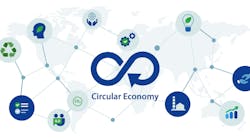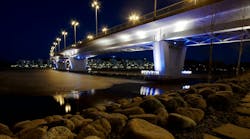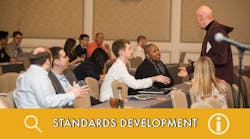LESA has developed the world’s first, high-speed, error-free, visible light transmission link over long distances.
Troy, NY - As the demand for mobile wireless services continues to grow, and the deployment of Internet of Things (IoT) technologies expands, Visible Light Communication (VLC) is emerging as a potential broadband transmission technology that will offer virtually unlimited spectrum for high quality wireless services. The Center for Lighting Enabled Systems and Applications (LESA), an Engineering Research Center funded by the National Science Foundation headquartered at Rensselaer Polytechnic Institute (RPI) recently achieved the world’s first high speed visible-light transmission link with a fully integrated microchip receiver.
Troy, NY - As the demand for mobile wireless services continues to grow, and the deployment of Internet of Things (IoT) technologies expands, Visible Light Communication (VLC) is emerging as a potential broadband transmission technology that will offer virtually unlimited spectrum for high quality wireless services. The Center for Lighting Enabled Systems and Applications (LESA), an Engineering Research Center funded by the National Science Foundation headquartered at Rensselaer Polytechnic Institute (RPI) recently achieved the world’s first high speed visible-light transmission link with a fully integrated microchip receiver.
These first-of-a-kind integrated results advance the use of the unregulated visible spectrum in high speed wireless systems. VLC has the potential to add significant value to existing lighting infrastructure, enabling cost effective, high-bandwidth, wireless, lighting-enabled communications. As soon as LEDs replace conventional lighting, VLC can be employed in a wide variety of industrial, commercial and residential applications.
The low-cost, compact, integrated microchip receiver developed at the LESA ERC will enable development of more advanced technology that can be used for applications such as imaging, indoor GPS, occupancy tracking, self-alignment, and the hand-over required for mobile wireless scenarios.
In conjunction with RF wireless technologies, VLC is a promising candidate for inclusion in future 5G communications platforms. It also opens the path to new applications in outdoor applications, such as building-to-building, streetlight-to-streetlight, vehicle-to-vehicle and industrial communications where current wifi networking can suffer from interference issues. Interestingly, higher frequency radio-frequency platforms (60 GHz and mm wave) have characteristics very similar to light-based communications (e.g., line of sight, limited ability to penetrate certain materials), making VLC based platforms a contender for advanced high bandwidth wireless communications.
About the Center for Lighting Enabled Systems & Applications (LESA) ERC
Funded primarily by the National Science Foundation (NSF), the ERC is an interdisciplinary, multi-university center developing “Smart Lighting Systems that See and ThinkTM”. The Center engages faculty members, graduate students, research staff, and undergraduates to work on research leading to smart lighting systems with adaptive and controllable properties that will change the way society uses lighting. The Center joins academia, industry, and government in partnership to produce transformational-engineered systems, along with engineering graduates who are adept at innovation and primed for leadership in the global economy. The LESA Center is headquartered at Rensselaer Polytechnic Institute in Troy, NY, and partners with Boston University, The University of New Mexico and Thomas Jefferson University to achieve its objectives.
About Rensselaer Polytechnic Institute
Rensselaer Polytechnic Institute, founded in 1824, is the nation's oldest technological university. The university offers bachelors, masters, and doctoral degrees in engineering, the sciences, information technology, architecture, management, and the humanities and social sciences. Institute programs serve undergraduates, graduate students, and working professionals around the world. Rensselaer faculty are known for pre-eminence in research conducted in a wide range of fields, with particular emphasis in biotechnology, nanotechnology, information technology, and the media arts and technology. The Institute is well known for its success in the transfer of technology from the laboratory to the marketplace so that new discoveries and inventions benefit human life, protect the environment, and strengthen economic development. http://rpi.edu
Contact:
Ann Seman+1 (518) 276-2041
E-mail:
[email protected]Submit new products, case studies/projects, and other press releases at http://www.ledsmagazine.com/content/leds/en/addcontent.html.




